![]()
![]()
MENZ Issues October 2000: Volume 5, Issue 7
Energy Crisis Hits Men’s Centre Serious questions must be confronted about whether this organisation has enough voluntary support to keep running in its present form.
Mensline Warns of Men’s Anger, Frustration & Hopelessness In 1998 Mensline undertook a national media programme in which one aspect featured a women abusing a man. The result was numerous calls from Northland to Southland from men wanting to tell their situation and find ways of resolving the abuse to which they were subjected.
Access, Custody, and Domestic Violence – Mana Men’s Rights Submission It is my belief that we have institutionalised the alienation process to the point where it has become glaringly obvious that when you remove, bit by bit one parent from the equation it is not in the best interests of the child or children, resulting in the new illness of the millennium "Parental Alienation Syndrome".
"Enough Is Enough"– Muriel Newman MP I say – enough is enough. In a civilised society in the 21st century we should not be condoning laws that cause such damage, hurt and bitterness and we should not be condoning laws that turn innocent children into a powerful weapon of destruction.
Family Court Has Blood On Its Hands – Again! "The Family Court has been a major contributor to a succession of child murders in New Zealand over recent years", Darryl Ward, spokesperson for Families Apart Require Equality (FARE), stated today.
QC Wrong To Dismiss Family Law Death Warning The Law Society on Friday slammed FARE (Families Apart Require Equality) for claiming that bad family law can result in tragic deaths. John Priestley QC, said that "it is nonsense to say that NZ law and the Family Court encourage parents to fight over children".
Nelson Fathers’ Experiences Studied Concern was expressed that most previous research on ‘parenting’ has focused on the experiences of women. There is a need to reduce the negative stereotypes and myths surrounding fathering before service providers can adequately address the needs of dads.
Violence and ‘Independent’ Policy Advice In 1994 Susan Snively undertook a study for the Department of Social Welfare, The economic cost of family violence. It makes extreme claims, including one that each year 37,711 women and children in New Zealand need dental treatment as a result of family violence.
When Men Have Wrong Expectations… I have spent a couple of hours reading your Men’s Centre website and following some of the links through. Thank you for a most informative presentation.
Men Need Support From Other Men Sadly, some men as well as some women make the mistake of allowing their own pain and fear to take precedence over the welfare of their children.
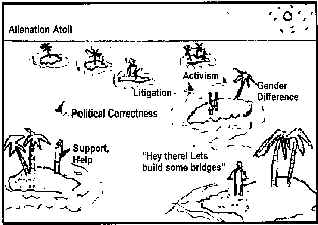 Cartoon by: Richard Wheatcroft
Cartoon by: Richard Wheatcroft
Energy Crisis Hits Men’s Centre
Regular MENZ Issues readers will have noticed that the gaps between newsletters have become longer in recent months, and that there has been no news of the Annual General Meeting advertised for the 20th of September. Although nine members turned up, it was decided that in the absence of an agenda, financial report, chairman’s report or any nominations for the executive, the meeting could not proceed. Another meeting has been advertised for the 8th November, with Richard Wheatcroft nominated as Secretary and Mark Walsh as Chairman. We still need to find a Treasurer, and three or four committee members. If you are willing to assist but unable to attend the meeting, please send a note to PO Box 15, Albany Village as soon as possible. It is hoped that there will be a full attendance of men interested in furthering the important work of Men’s Centre North Shore.
After three years of intense involvement with the Executive Committee it has become necessary for me personally to step back and direct some of my energy towards building up my new website design business. Accordingly, I will not be standing again as an executive member. I had hoped that over the course of 2000 other members would increasingly take on the administration and leave me free to edit the newsletter and run the menz.org.nz website, but sadly this has proved over-optimistic. Serious questions must be confronted about whether this organisation has enough voluntary support to keep running in its present form. Now is the time for all of you who acknowledge there is a need for an organisation supporting men on the Shore to come forward and put in some time on the committee.
Part of the problem, as Jim Bailey alluded to in this newsletter on several occasions before his resignation as chairman, is that there is an inherent conflict between being a Social Service provider and a political activist group. While we strongly encourage all people to protest individually against injustice, as an organisation the Men’s Centre North Shore has consistently declined to be directly involved in any of the demonstrations that have taken place in recent years. This stance has resulted in the formation of new groups with explicitly activist agendas, and many of our highly committed and energetic members have gravitated towards them.
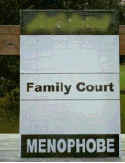 Photo: A few months ago this sign, with the name visible, was placed outside the home of a Family Court Employee.
Photo: A few months ago this sign, with the name visible, was placed outside the home of a Family Court Employee.
Several months ago there was significant conflict between core Men’s Centre members about the appropriateness of demonstrating outside the private homes of Family Court employees. Jim Bailey and I took the view that there is more to be gained by establishing lines of communication with the Family Court so that we can encourage them to become more male-friendly, as opposed to escalating protest action. We also believe that a clear distinction needs to be made between demonstrating against institutions and organisations as opposed to individuals.
However, it became quickly obvious that we were in a minority among our active members, many of whom do not enjoy a satisfactory relationship with their children like Jim and I do.
From these disenfranchised fathers’ perspective, Family Court staff are directly complicit in "kidnapping" their children and "holding them hostage." They argue that appeasement is ineffective and that individuals who perpetrate this evil are choosing thereby to place themselves at risk of retaliation. While I don’t believe anyone’s safety is threatened by men in organised fathers’ groups, there is always the possibility that demonstrations and protests will attract hotheads intending to act illegally in the anonymity of a crowd.
There was a minor example of this on the 20th May Family Day march – one man (who was completely unknown to any of the organisers) took a placard and added "death to the pigs" or something similar with a felt pen. The first anyone knew was when police confiscated the offending sign and presumably arrested the protester. The reality is that there are a lot of very angry, desperate and irrational fathers out there who feel they have little to lose after they have been dealt to by the Court. In my opinion the danger of a demonstration spinning out of control is a real one, and organisers should take this into account when selecting targets.
On the other hand, anyone currently employed in the father-removal industry needs to wake up to the fact that they are attracting a considerable degree of hostility from large sections of the community. Certain names get mentioned over and over again in support groups such as ours, and some of these individuals may eventually become targets of their victims’ rage and frustration if reform does not take place soon.
All of the men’s group leaders that I have talked to understand that violence will not advance our cause, and that it is more likely to undo the considerable progress that has already been made. One of the most tragic mistakes the feminist movement made was to support those who believe that two wrongs can make a right. I sincerely hope the Men’s Movement can avoid falling into the same trap.
John Potter.
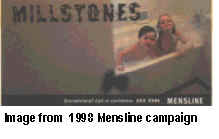
Mensline Warns of Men’s Anger, Frustration & Hopelessness
Extracts from Bruce Mackie’s submission to the Social Services Select Committee in support of the Separated Father’s Support Trust petition for a review of family law and related legislation.
I have a concern for our community developed through experience with women, children and men in distress. I have become particularly aware of the plight of males in our community and how failure to address this issue ends up hurting everyone.
This concern for males has grown from experience in my agency work and my private practice since I first began my career. My concern led to the establishment of the Mensline telephone service for males, operated by males and two group programmes.
Men are abused by women:
In 1998 Mensline undertook a national media programme in which one aspect featured a women abusing a man. The result was numerous calls from Northland to Southland from men wanting to tell their situation and find ways of resolving the abuse to which they were subjected. One man from Waikato told how his wife used a heavy frying pan and fractured his skull, another how he was afraid to go to sleep at night, others how they were stabbed, one who had just returned from hospital after his partner stabbed a pair of scissors through his hand. It was as though Mensline had exposed the flip side – the side everyone wanted to deny of domestic violence.
There is no New Zealand research of men as victims of women’s violence, and there is no research of women as perpetrators of violence against men. Some commentators indicate they do not think that this exists as a problem, and that any physical or psychological abuse of men by women is a minor problem in comparison to men’s physical and psychological abuse of women.
If these issues are not researched, it is hard to see on what basis such sweeping and important assumptions are made. If these views represent the official line, it is hard to see how the necessary research will ever be undertaken. Mensline experience is that there is a serious problem and men are not permitted to address it openly because of the official denial of its existence.
Men – Access and Custody
The Mensline telephone service is a limited hours service – operating every evening and serving the greater Auckland region. It receives around 2000 calls a year and reflects some of the more serious concerns of male callers as they express them to men.
One hundred reports were chosen at random from calls received by this service since Jan 2000 to July 2000.
Table 1: 100 Calls to Mensline
29% Custody Access issues
21% Relationship family issues
16% Sexually related issues
6% Sex abuse
12% Mental Health
3% Explicit suicide
Half the calls reported concern around access, custody, relationship and family issues! Contrary to the myths perpetrated about men not caring, not feeling, or even being dead beat dads – our experience is just the opposite. What cannot be measured from these reports is the intensity of affect in each of these callers. Counsellors report feelings of anger, frustration and long term serious distress. As workers in the field know some of these callers suffer from conduct disorder – and may be vulnerable to acting out against property or people and/or becoming self destructive. There is widespread disillusionment with the Family Court system by men. Many report the experience as institutional abuse.
I draw the Select committees attention to the seething anger, the fury of frustration and the harmful hopelessness of men around the family law and related issues as represented by these callers to Mensline.
Table 2: Access and Custody Issues
Date Reason for call
2/2 Angry, separated from wife and children
10/2 Separated 7 years, has no access to daughter now aged 13
16/2 Difficulty handling access, 14 yr old son
17/2 Access being frustrated and denied
22/2 Ex has stopped letting him see his child Wants referral for custodial parent rights, issues with daughter
24/2 Problems over shared custody of daughter with ex wife
4/4 Angry at ex over custody
5/4 Relationship ending, fear about access
8/4 Wife at airport flying out with children
12/4 Anxious losing daughter to ex wife’s new man – access
13/4 Psychologist report making it difficult for him to see child
18/4 Deduction from pay for child support – frustrated access
21/4 Lots of trouble with access to children
23/4 Wife & children left
2/6 Custody of children on unsatisfactory level
3/6 Upset at legal system separated fathers, problem with child access
4/6 In bitter custody fights, he has custody
6/6 2 children from previous marriage, access difficult. Wanting access to daughter
9/6 11 yr old son disappeared with wife
11/6 Children taken by partner
16/6 Seeking better access to his daughter
27/6 Angry over relationship access children While in hospital wife took children, now only 1 on supervised access Tried 3 lawyers for supervised access, given up.
29/6 Not able to see young daughter
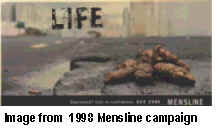
Undermining Masculinity
In my work I am constantly reminded of the manner in which issues seriously affecting men are ignored or discounted or handled in a manner which destructive of male self concept. This is pervasive and affects every area of male life from employment, justice, education, health, social services, even religion. There appears to be a mind set among service providers that males are disposable, useless or "bastards". Men cannot be victims – they are always cast in the perpetrator role. They are undeserving of resourcing or enabling apart from increasing punitive methods (refer to Justice Dept. Statistics). Even to express this view or advocate for men results in an overwhelming backlash and attack – to the end that men’s voices have been largely silenced.
It has most obviously been silenced as regards their children, their family and domestic violence. There are some men (and some women) who now believe this is intentional. Even research that contradicts the entrenched perspective is sidelined or ignored. We are consequently evolving another form of injustice in our society
This crisis for men involves the degradation and undermining of the timeless concept of masculinity itself. Older, generative concepts of masculinity have been destroyed over the last several generations and in their place a little-known defective mythology has been indelibly encoded into our social structures and psyches. Men live and breathe these myths on a daily basis. It is the basis for many of their dysfunctional daydreams and most of their nightmares. It has led society into a dangerous "misandry", a belief that masculinity itself is responsible for most of the world’s woes.
Conclusion
I suggest the time is long overdue for a Ministry of Men’s Affairs – (staffed by and representative of men) to advocate for men – to monitor legislation, to promote responsible research, to introduce some equity into increasingly inequitable systems. Such a Ministry would sit alongside the Ministry of Women’s Affairs and the Commissioner for Children.
Bruce Mackie Director, Lifeline.
To find out about becoming a Mensline counsellor phone Lifeline office (09) 524 3080
Bruce Mackie’s submission also contained material from Stuart Birks’ website: http://www.massey.ac.nz/~kbirks/gender/viol/ofv2.htm
Access, Custody, and Domestic Violence – Mana Men’s Rights Submission
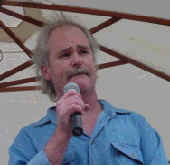 Photo: Bruce Cheriton speaking in Aotea Square after the Sept. 2000 Father’s Day Parade
Photo: Bruce Cheriton speaking in Aotea Square after the Sept. 2000 Father’s Day Parade
The Right Honourable Sir Michael Hardie Boys, Governor General of New Zealand at a Father’s Breakfast given by the Mayor of Lower Hutt, John Terris on 16 March 2000 said: "If present trends continue, by 2010 1/2 of European and nearly 3/4 quarters of Maori infants under 12 months will be in families where there is no father and there are many many other families which are also really fatherless because although father may live in the house, he has no time, or no inclination, to play his nurturing role to make his house a home. Unless we can turn things around we as a nation are going to be in serious trouble".
For the first time in history in New Zealand we as a generation are being asked to accept the concept that a child can be raised adequately without one parent. The idea at the time of separation that one parent could be an "allowable loss" is now the accepted standard for the Family Court, the Counselling Service, the Living Without Violence Programmes, CYPS, Women’s Affairs Ministry and many, many more social support agencies and government departments.
This has been a rather unfortunate experiment with dire consequences being felt right across the community. Jenny Shipley MP, Leader of the Opposition, last year at a book launch for Fatherless Sons (Rex McCann) described fatherlessness as "the next big social problem facing New Zealand".
As we now have upwards of 90,000 children living only with one parent, generally the mother, anger, aggression, and bullying are starting to be recognised as a symptom of ineffective parenting. 80% of rulings in the Family Court have been in favour of the female partner regards custody and access.
All in all it is my belief that we have institutionalised the alienation process to the point where it has become glaringly obvious that when you remove, bit by bit one parent from the equation it is not in the best interests of the child or children, resulting in the new illness of the millennium: "Parental Alienation Syndrome".
We have sick systems creating for us a sick society which we are now having to find cures for. In my work I encourage my clients not to be so caught up in the sick system, but work to bring about resolution of parenting issues outside of the conflict. I deal in Parenting Plans, Personal Recovery Plans, Conflict Resolution and Separation Coaching.
This approach can change lives and save families, reduce violence and in some instances changes the dynamics from conflict to peaceful resolution.
Our system in the Family Court process and accompanying social support agencies is called an adversarial system. This pits two sides against each other in a winner takes all scramble for the spoils of battle which is money, possessions and of course children.
Add to this cauldron such mechanisms as the Domestic Violence Act (the allegation industry) and you now have a recipe which will see some people sentenced to life under a Domestic Protection Order, alienated from their children, bitter and angry for years into the future; and the other living with the illusion someone is protecting them until the reality hits home that a Domestic Protection Order is just a piece of paper, and that the police can’t watch and protect you, and the court will not and cannot protect you, and it is the goodwill of the "perpetrator" nothing else.
In the Wellington District there are 8000 men with Protection Orders against them and only four women.
Therefore we can conclude that with 80% of rulings in the Family Court being in favour of the female partner and there being an overwhelming use by women of the Domestic Violence Act it is hardly surprising that the Governor General concludes his statistics of fatherlessness up to the year 2010, as he observes this disaster unfolding.
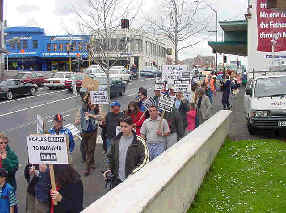 Photo: September 2000 – Father’s Day Parade head’s down Queen St to Aotea Square
Photo: September 2000 – Father’s Day Parade head’s down Queen St to Aotea Square
The lack of regard for fathers and men and their children is now so entrenched in our system that unless a person gets custody of the children, the father or non-custodial parent will be regarded by WINZ to be single without children and paid accordingly therefore many many fathers financially can simply not afford to participate in the life of the children or will turn to crime to alleviate the money shortfall ending up in the criminal justice system. I note at this point Honourable Matt Robson, Minister of Corrections can see the correlation between good parenting and reducing repeat offending.
As the awareness around male domestic violence has grown over the past ten years since the introduction of the Domestic Violence Act in the early 1990’s male domestic violence all around has now fallen and continues to fall. In a report released November 1999 by Dr Felicity Goodyear-Smith, Auckland University puts the domestic violence figures – men 45%, women 55%, with 60% of violence against children under 5 years being women.
I am disappointed not enough resources are given to dealing with female domestic violence, in fact it is hard enough to get someone to take the issue seriously. A good example is the Living Without Violence Progammes which use the Duluth Model from the USA which says "men are violent and perpetrators, women are victims".
In conclusion I must congratulate Dr Muriel Newman and the ACT Party for their contribution to the debate by the introduction of the Shared Parenting Bill, thereby identifying them within the parenting movement as the politician and party which is now identified as being pro-family.
Of recent times there has been the announcement of a review of the Guardianship Act which will not start until some time next year with a discussion paper at present circulating.
60,000 children will be born in New Zealand this year. One third of those children will be involved in family separation within 12 months of their birth. This equates to 55 children every day of every week effected by Family Law. This is the reason Family Law can now be identified as contributing to the social disintegration we see around us.
Are all of these things really in the best interests of our children?
Bruce Cheriton, Chairman
Mana Men’s Rights Group
Ph: (04) 232 3775
Email: [email protected]
"Enough Is Enough"- Muriel Newman MP
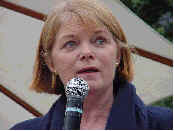 Photo: Muriel Newman MP speaking at the 2000 Father’s Day Parade
Photo: Muriel Newman MP speaking at the 2000 Father’s Day Parade
The tragic murder suicide of Rosemary Perkins and her three daughters Alice, Maria and Cherie, aged 8, 6, and 23 months, is a shocking reminder of the urgency of the need for change to New Zealand’s family laws.
The present system, based on an adversarial "winner takes all" ideology, encourages conflict and aggression, as parents are driven to fight over the most precious thing in their lives, their children.
Newspaper reports claim that the couple had been in court that morning and that Mr Perkins had been given unsupervised visiting rights with his children. That action of giving a non-custodial father greater access to his children, was apparently a significant factor in the tragedy. It follows the 1995 deaths of Tiffany, Holly and Claudia Bristol, three children murdered by their father who also killed himself during acrimonious litigation, and a 1997 murder suicide of a mother and her two children.
Recently I spoke to a grandmother whose son committed suicide earlier this year – he loved his two children but had only seen them three times in the two years since he and his wife had separated. In the end the loss was too much to bear and he took his own life leaving a note asking his parents to take care of the children. Those parents lost their son and those children lost their father, all because of our adversarial family law.
Well I say – enough is enough. In a civilised society in the 21st century we should not be condoning laws that cause such damage, hurt and bitterness and we should not be condoning laws that turn innocent children into a powerful weapon of destruction.
Thirty years ago in the United States, murder-suicides of parents and their children repeatedly made the headlines. Legislators said enough is enough and they devised a change that took the conflict out of family law. Shared Parenting was the fastest spreading family law change ever to sweep through the United States. Based on the notion that after family breakdown children do better if they have the on-going support of both their mother and their father, shared parenting introduced a co-operative and consensual framework into family law. The result is less acrimony and conflict, less divorce, and more importantly better outcomes for children.
Earlier this year I introduced such a Bill into Parliament. Sadly for the hundreds of thousands of parents locked in conflict, grandparents alienated from their grandchildren, and children caught up in a viscous crossfire between the two people they love most in the world, the government voted my Bill down, refusing to let it go to a Select Committee.
But Shared Parenting is an idea whose time has come, and a father from Dunedin, Tim Hawkins, paid the $500 to launch a petition to call for a Citizens Initiated Referendum into Shared Parenting. I have pledged my support for Tim’s petition, I am now going around the country talking to groups to ask them to support us as we collect the 250,000 signature we need.
 Photo: Muriel Newman speaking to television reporters about Shared Parenting after the Father’s Day Parade
Photo: Muriel Newman speaking to television reporters about Shared Parenting after the Father’s Day Parade
All around the world, countries concerned about the weakening of the family unit and the affects of family breakdown on children, of fatherlessness, of child abuse, and the growing numbers of children at risk of poor outcomes in life, are turning to Shared Parenting. It is the law in the United States, in France, in Sweden and in Holland. Canada, the UK and Australia are all going down the path to Shared Parenting. With your help, we can add New Zealand to that list as well.
The question for the Citizens Initiated Referendum on Shared Parenting is-.
"Should the Shared parenting Bill introduced by Dr Muriel Newman (which creates a presumption that parents who are separated or divorced will have equal rights to custody of their children) be passed by parliament?"
The petition form is available on the ACT website at:
If you are able to lend a hand, please contact:
Family Court Has Blood On Its Hands – Again!
Media Release – 4th October 2000
"The Family Court has been a major contributor to a succession of child murders in New Zealand over recent years", Darryl Ward, spokesperson for Families Apart Require Equality (FARE), stated today.
 Photo: Darryl Ward, FARE
Photo: Darryl Ward, FARE
"As a nation we are deeply saddened by the tragic deaths in Nelson on Sunday of Alice, Maria and Cherie Perkin, and their mother Rosemary Perkin. The Nelson girls were just eight, six and 23 months old respectively. Yet there has been a succession of such incidents in New Zealand in recent years. In 1995 for instance, Tiffany, Holly and Claudia Bristol were murdered by their father, who also killed himself at the same time during acrimonious litigation. The Bristol children were just nine, five and two when they died. The Perkin and Bristol children were young, healthy, and in the prime of life, till they died at the hands of one of their parents who was locked in a destructive Court battle.
In these cases the problem is the Family Court, which almost invariably encourages separating parents to compete with each other in a winner-takes-all battle to have control of the children. It is the custodial parent who will get effective ownership and control of the children, and all the benefits that come with them. The Family Court imposes a win-lose outcome. In this environment parents are driven to fight over the most precious thing in their lives, their children.
Parents become so desperate they become irrational, and faced with potentially losing their children (or control of their children), the parents can and are driven to the extreme of murdering themselves, and their children.
The Family Court urgently needs to change its procedures to prevent more children dying in this way. In the USA, and many other countries, a far better system known as ‘shared parenting’ has been adopted.
Instead of the parents being forced to compete with each other to be the ‘winner’ or sole physical custodian of the children, they are both made physical custodians. The parents are encouraged to work together instead of competing with each other. If one parent is uncooperative, they stand to have the Court remove their joint custodial status. Thus, instead of parents being forced to fight, they are encouraged to cooperate.
The benefits of shared parenting are dramatic. The number of ongoing court cases is halved, as arguing between parents is greatly reduced.
The divorce rate is dramatically reduced, as is the uptake of social welfare benefits. The only negative outcome is reduced earnings for lawyers, psychologists and others who profit from the suffering endured by children caused by the current regime.
Under current New Zealand family law the Family Court could exercise effective shared parenting, but the Judges for some inexplicable reason will not consider shared parenting as the preferred outcome to protect the welfare of children. Earlier this year, ACT MP Muriel Newman introduced a Private Member’s Bill that aimed to reduce the tensions between parents by favoring the shared parenting model that has been so successful overseas. The Government rejected Newman’s Bill outright, and would not even allow it to go to a select committee.
In Nelson this weekend children died once again because the Family Court, and the Government, are not fulfilling their responsibilities to the community, and refuse to use up-to-date and non-adversarial techniques to resolve child custody and access disputes. The Family Court is breaking the fundamental principles of the laws it is supposed to administer by consistently not acting in the best interests of children.
FARE calls on the Principal Family Court Judge, and the Government, to publicly state what they are doing to eliminate the tensions between divorcing parents and reduce the risk of this latest tragedy in Nelson being repeated yet again, which will most certainly happen again if nothing is done", concluded Ward.
Enquiries to Darryl Ward
025 230 1667
E-mail: [email protected]
Secret Family Court Judgement
This issue I had hoped to be able to pass on news of a ground-breaking Judgement made in the Family Court earlier this year.
I sent a summary with all identifying details removed to the Judge concerned on 17th July asking his permission to publish it. He replied within a week saying he had passed it on to Judge Mahony to make the decision about publication. I wrote to Mahony on 10th Oct. asking for a reply, but have heard nothing. [Permission was granted after this edition went to the printers – read it here].
Lawyers for Television NZ are currently arguing in Court that it is in the public interest that this case be reported.
J.P.
Note: after the October MENZ Issues went to the printers we received a letter from Judge Mahony saying that we can publish a summary of this important judgement. It will be in the next issue.
QC Wrong To Dismiss Family Law Death Warning
Media Release – 8th October.
The Law Society on Friday slammed FARE (Families Apart Require Equality) for claiming that bad family law can result in tragic deaths. John Priestley QC, said that "it is nonsense to say that NZ law and the Family Court encourage parents to fight over children".
 Photo: Stephen Franks MP
Photo: Stephen Franks MP
But ACT Justice Spokesman Stephen Franks called instead for reasoned debate on proposed changes which may increase irrational violence, especially toward judges and lawyers.
"Of course fights are inevitable. Sadly, children are valuable tokens, giving to the parent who gets them exclusive right to assets and control of access" said Mr Franks. "Some of that is unavoidable, but Mr Priestley surely knows of the Family Court judges’ concern, that the government wants new property law that could make things worse.
The principles of ‘equal sharing’, ‘clean break’, and ‘no fault’ are to go, but to what extent no one can tell, because it will be left to the judges to decide.
Principal Family Court Judge Mahoney took the unusual step in July of going to the Select Committee dealing with the Property (Domestic Relationships) Bill which will change our matrimonial property law, to plead that it spell out more clearly what it intended.
He came because the Bill just states lofty intentions. It will force the judges to try to work out what it should mean in each case, at the expense of the thousands of unhappy families who have to pay for needless cases when no one can tell them in advance what the result will be. The Law Commission had a similar worry.
In Australia, Family Court judges have been murdered. A climate of menace can flow directly from uncertainty in family law. The disappointed party knows that the lawyers, not the law, have decided the outcome. The law leaves the judges such wide discretion, that the decision can turn on how the judge feels about the case.
Law should be about rules known in advance, not the feelings of the particular judge on the day. Each side’s lawyers should be giving their clients much the same advice about what the will happen if the case goes to trial. That is what the rule of law means. But it can’t happen when the law is framed as slogans, not clear rules.
When there is no sign that the Government is listening the Law Society should have acknowledged the issues raised by FARE, even if it is too much to say that the tragedy in Nelson would not have happened under better law.
A dramatic law change is being rammed through. The Select Committee is to report next month. The public has heard mainly that it extends to de facto and same sex couples.
Much more is at stake than that. The change ups the "bitterness token" value of children to the party who "wins" the case. The Law Society should be taking every opportunity to get us to think about the Judges’ concerns, and to raise our sights to look at overseas experience," said Stephen Franks.
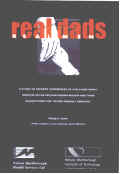
Nelson Fathers’ Experiences Studied
In the first research of its type in New Zealand, 150 Nelson dads were asked about their experience of Child & Family services in the region.
Researchers found that fathers were in need of support and often felt vulnerable before the birth of their children as well as at and after the birth – exactly the times that fathers are expected to be offering support to their partners.
It also showed that fathers felt they needed access to more help during the pre-school years, during separation, and when step-parenting, and that they often can’t communicate their sense of isolation and difference when involved with the range of child and family services.
Concern was expressed that most previous research on ‘parenting’ has focused on the experiences of women. There is a need to reduce the negative stereotypes and myths surrounding fathering before service providers can adequately address the needs of dads.
The report concluded that developing a sound and valid information base that involves men in all aspects of the research is vital.
Violence and ‘Independent’ Policy Advice
In 1994 Susan Snively undertook a study for the Department of Social Welfare, The economic cost of family violence. It makes extreme claims, including one that each year 37,711 women and children in New Zealand need dental treatment as a result of family violence. It also assumed that all family violence was by men against women and children.
 Photo: Economist Susan Snively
Photo: Economist Susan Snively
This appears to be consistent with the position of Women’s Refuge, if we are to judge by events in the Manawatu not so long ago. In 1997 a Family Violence Symposium was held in Palmerston North. Participants included the Principal Family Court Judge. There was "vigorous debate" about alternative approaches to family violence. The debate led to mediated discussions between certain groups, resulting in a two-page statement being issued by Manawatu Men Against Violence.
To quote from the statement: "We wish to acknowledge the anger and grief felt by the committee members representing Palmerston North Women’s Refuge by being associated, through their committee involvement, with presentations which neither they nor the Women’s Refuge endorsed nor accepted."
It is a concern that Palmerston North Women’s Refuge wished to limit presentations to include only those that they "endorsed and accepted". They appear to have objected in particular to a play/presentation. The statement describes this: "Although we realise that the play and presentation did also reflect the viewpoint that ‘men can be victims too’ and ‘women can play their part in this’ we believe that at the time it was presented in the spirit of a contentious and debatable viewpoint …This viewpoint is certainly not endorsed by Manawatu Men Against Violence policy or actual practice".
Susan Snively has been actively researching family violence more recently also. The report of a further study she had undertaken for The National Collective of Independent Women’s Refuges was released in May this year. The Refuge press release described the findings:
-despite the well targeted and organised services provided by Refuge current levels of expenditure results in only 11 percent of women who access Refuge services known to become free from violence.
However the study found that if Government funding was doubled from $4 to $8 million the number of women and children known to be free from violence would more than double to 28 percent. This represents a 250 percent improvement in the number of women known to be free from domestic violence-
Brett Cate, in an article, "Abuse Facts", in The Press of 24 July (p.21) referred to it as "an independent report".
This is stretching credibility, however. Jan Corbett wrote a piece, "Women’s Refuge now a political lobby group", published in the New Zealand Herald on 25th July this year. It contained the revealing information that, until last year, there was a Women’s Refuge Foundation. This was "the fundraising branch made up of high-profile middleclass women such as economist Suzanne Snively".
Stuart Birks.
When Men Have Wrong Expectations…
Dear John Potter
I have spent a couple of hours reading your Men’s Centre website and following some of the links through. Thank you for a most informative presentation.
I have 2 children, boys, 7 & 4. I see symptoms of Parental Alienation Syndrome in my children, particularly the 4-year-old. I absolutely agree that the norm in NZ of 4 days a month access is not sufficient to provide children with a caring, involved and significant father-figure. I absolutely agree that the system seems incredibly biased towards giving mothers full custody and casting fathers as the ‘disposable parent’. I absolutely agree that this is not in the best interests of the children. I want a joint custody scenario with my children where they get as much of each parent as they possibly can. That is in their best interests. That will provide the best possible basis for them to grow to be well-adjusted adults. That will enable them to develop close relationships with both parents.
You will quite possibly think that this is bizarre coming from me because I am a woman. Why am I writing to you? Because I am in a somewhat backwards situation. I have seen the detrimental effects on my children of reducing from weekly to fortnightly contact with their father, who, when he has the children (and I’m not within a 5-mile radius), is a good and caring father and provides them with what they need in both a physical and emotional sense. He does not want to see them more than once a fortnight, the main reason being because I want him to.
So the reason I am writing to you is in the vague hope that, after hearing my story, if you were able to provide me with any suggestions that actually worked to pass a court judgement that was really in the best interests of the children, a judgement that brought attention to the fact that both the mother and the father were vital to the well-being of the children, then this might in turn strike a trail that members of your Men’s Group who desperately want to be part of their children’s lives can follow.
Perhaps in a case where it was the woman’s side who was arguing the importance of the father, rather than the man’s side, there would be more chance of success.
Our story:
We were living on the North Shore and broke up at the beginning of this year. It was my choice and I told him in August 1999. He was shocked. I won’t bore you with the many reasons for the breakup. Suffice to say there were no affairs involved.
So at the beginning of this year we both moved away from Auckland, to where we both grew up. He took a house and farm-contracting position about half-an-hour away from me. He had the children on weekends and I had them during the week. I had made it plain right from the start that I considered joint custody the best for the children. He felt that an actual 50/50 split of care wouldn’t fit well enough due to his distance from the children’s school and the hours he chose to work. A weekend/weekday split was the next best option.
It worked as well as possible for the children. They considered their father a large part of their lives and settled in well.
So the breakup was relatively amicable to begin with. Then it went downhill.
He began writing letters to me and doing various other things in an attempt to get me back. When he came up against a brick wall, he got angry and it developed into the sort of thing you hear about with messy breakups and swear you’d never do yourself. Many long drawn-out angry phone calls, many angry confrontations.
I had made it a ‘law’ that I would not say anything bad about their father. I would remind them of his love for them and say only good things about him.
He did not extend the same courtesy. He told them that we were not a real family any mone and that the reason he did not see them very often was because ‘Mummy won’t let me live with you.’
When our 4-year-old started repeating this ‘We’re not a real family’, I spent a lot of time with him along the theme of ‘Families come in all shapes and sizes’. Even went to the extent of drawing pictures with him, showing his ‘Dad-house’ and his ‘Mum-house’ (he’s the type of child who thinks with his hands). This worked well and he absorbed the fact that he lived in both houses, and both houses were ‘his’ house. The pictures were kept on the fridge as reminders. Until his father’s anger increased to the point where he decided to cut the children’s access to him to once a fortnight. The effect on the children was profound. A fortnight to a 4-year-old is nothing less than an eternity. He could no longer take on the concept that he lived at Dad’s as well. If asked, he would no longer say that he lives in 2 houses. He’d say ‘Dad doesn’t live with us.’ The 7-year-old simply ceased to talk about Dad or any of the extended family on his side. The 4-year-old would say venomously that he hated him.
Things then got a little better. We started communicating again and Dad increased the children’s access to 3 weekends out of 4. The children improved a little. Then he got angry again. Cut the children’s visits down again. Their behavior got noticeably worse. The 4-year-old in his imaginings would talk about his own house where there was no Mum or Dad.
His Dad said that just as soon as he found a woman to look after them he was going to take full custody and I would get nothing. I knew little about the system at that stage, found out in short order, gave the information to him and he changed his mind.
We started communicating again. He promised that from 1st November he would take them weekly. He got angry again. Changed his mind. The 7-year-old, who normally keeps his feelings to himself, burst into tears on hearing this news.
I then decided to see what I could do about getting a written down and agreed upon parenting plan. I wanted to put this up-and-down nonsense away.
We went to Family Court and decided to take their counselling option. In fact, when we first broke up, he suggested and then demanded counselling. I thought it was his way to try to force me to stay with him and I refused. In hindsight, I should have done it.
So we went to our first counselling session. It didn’t go well for him. He spent most of the session tearing strips off me and the counsellor told him if he didn’t shut-up she was going to boot him out. And told him he’d given grounds then and there for a Protection Order. He told her he loved the kids and loved spending time with them, but didn’t want them more than 4 days a month because he wanted to make it hard for me and rub my nose in it for leaving him. Which completely flabbergasted me. Not that he thought it, I already knew that, but that he’d say it to a counsellor.
The counsellor decided ‘for my protection’ that she would not have us in the same room for the rest of the counselling sessions and conducted them separately. The last session was last Thursday. There has been no conclusion. He wants to see the children twice a month. I want them to see him more frequently.
You may be saying ‘Well, if he doesn’t want to see his kids, you can’t make him.’ Completely true. Which is why I am writing to you. It’s my last resort. I don’t know what else can be done. Maybe nothing. Maybe you know something. I have to try though, for the sake of my kids.
‘But surely it can’t be in the best interests of the kids to go there when he doesn’t want them.’
Also true. Except that I know that he loves them and cares for them well when he is there. The reason he doesn’t want them is to get at me. He tells me that. It is also interesting that the reverse seems not to apply. I would not hear people saying ‘But surely if she doesn’t want them on those days it is not in their best interests to go there.’ And when it is termed like that, I feel like an absolute cad. Because I do want them. I couldn’t possibly conceive of only seeing them 2 days out of every 14. But more than that, I want what is best for them. I don’t want them to grow up hating their Dad or hating me. I don’t want them to grow up maladjusted.
Looking at it from the kids’ point of view, I can’t think of a single reason why they would be better off seeing their father only 4 days a month. The emotional bond would tighten with more time with him. His parenting skills would improve with more time with them. Mine would also improve with more frequent breaks and I could give them more. It makes sense financially since I am in the enviable position of working from home and being able to choose my hours and can thus work weekends.
The only justification he has provided is that it means he doesn’t have much time to himself and thus would be a worse parent. I have said that for me to have them 12 days out of 14 surely doesn’t allow a whole lot of time for ‘me’. But being constantly on-call for your children is something parents need to deal with. His response is generally along the lines of ‘But the 4-yr-old goes to kindy in the mornings. You get that time.’ Me: ‘But I work during that time. Just as you work when you don’t have the kids.’ Him: ‘But that’s different.’ And so it goes in circles. And that justification has nothing to do with what’s best for the kids.
I can’t force this issue. But I am interested in what you have to say. It saddens me that a person would put revenge and bitterness as a higher priority than a child’s needs.
(Name withheld)
Men Need Support From Other Men
Dear Ms B,
Your boys are blessed to have a mother with an attitude like yours towards what is in their best interests.
In the coming years your boys will need their biological father even more than they do now, and I hope you can hold on to your vision of amicable co-parenting. I managed pretty much with my first wife for thirteen years after we split, so I can assure you it is possible.
Sadly, some men as well as some women make the mistake of allowing their own pain and fear to take precedence over the welfare of their children.
It is common for men to go through a period of denial while they come to terms with their shattered dreams. Stress and despair causes irrational thoughts and impaired judgement, which can lead to inappropriate courses of action. Hopefully, this condition will correct itself as he gets a new life together.
If your contact with him is hostile and ugly (especially around the kids), I suggest you keep it to an absolute minimum – and remember he is unlikely to respond positively to useful suggestions from you, no matter how well intentioned they are. You may want to organise access pick-ups and deliveries with a third party so that you can avoid contact altogether – Banardos may be able to organise this if you have no family or friends available.
You can always ask the Family Court for more free counselling to sort out problems, and if the counsellor they assign you is unable to get engagement with your ex, ask to try another one.
Your ex-husband would benefit from contact with other men who understand what he is experiencing and can help him see where his responsibilities lie. In the past a number of men have travelled from your town to our Monday meetings.
As for the big picture – I think the only way to fix things is to change our social policies so that all people expect that the responsibility for the care of children after divorce will be shared equally by both parents. The idea that fathers are expendable is yet another of the 20th century’s toxic legacies that we have to deal with as a society.
If you agree, I would like to publish your letter in our next newsletter (with your name and town withheld) in the hope that you will inspire other women to take the responsible stance that you have.
J.P.



